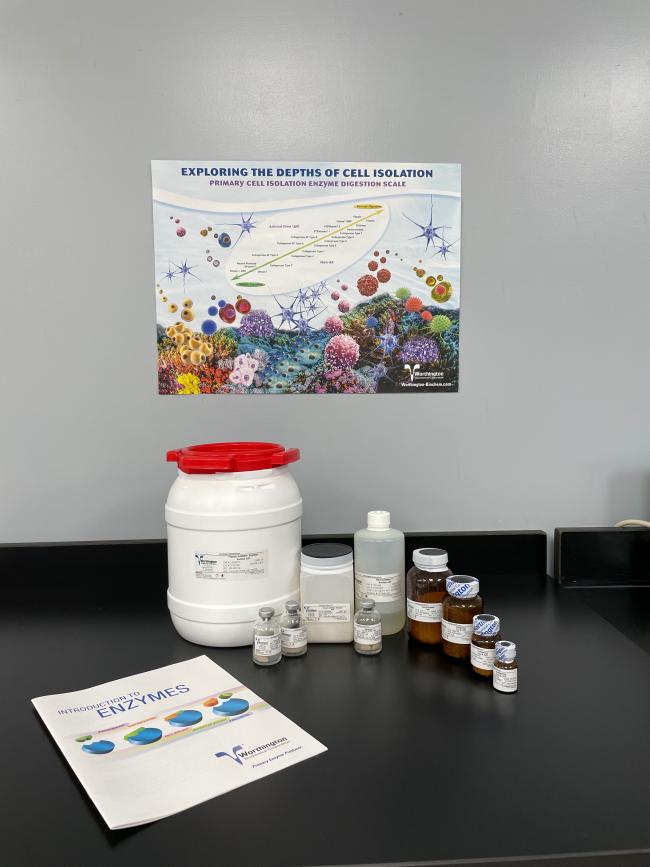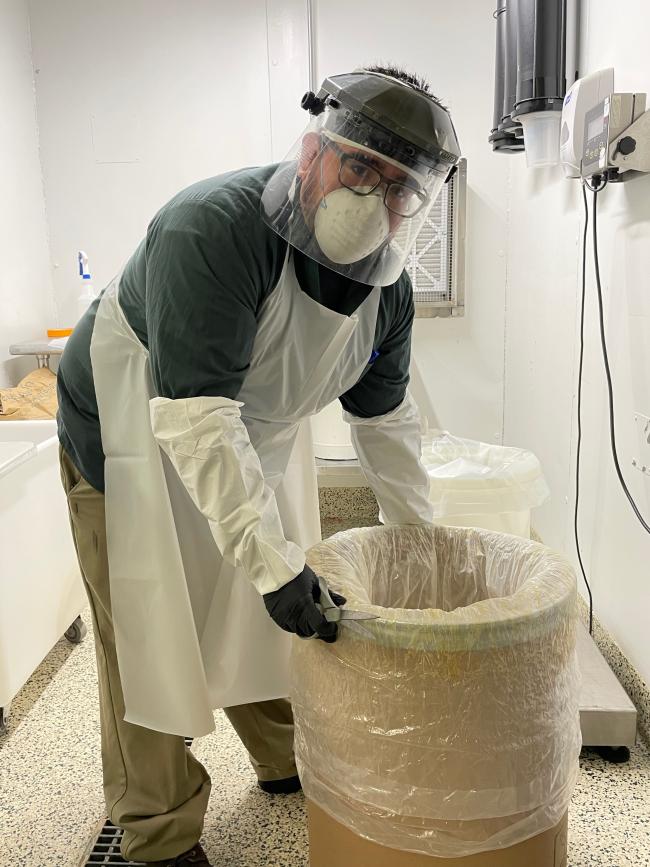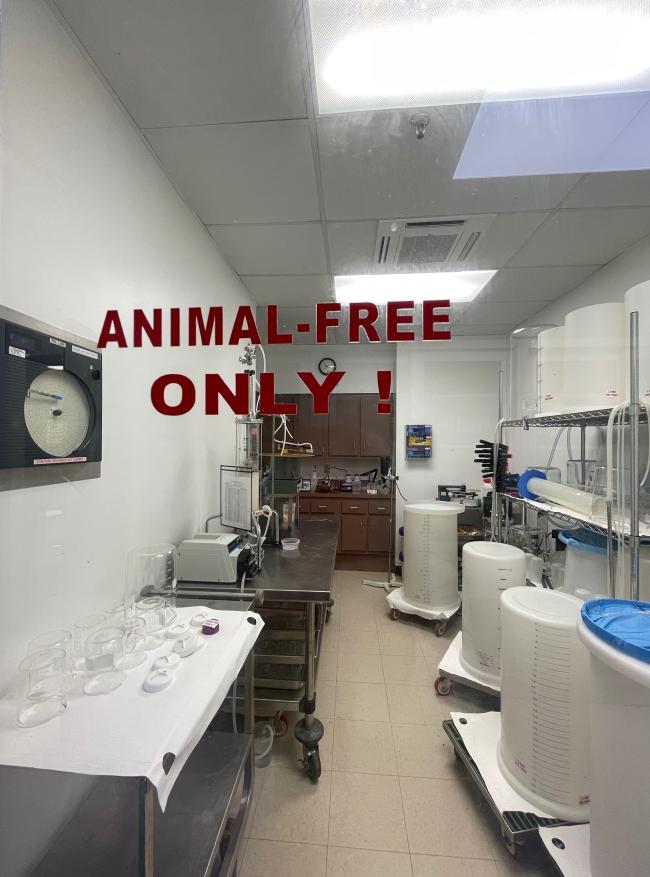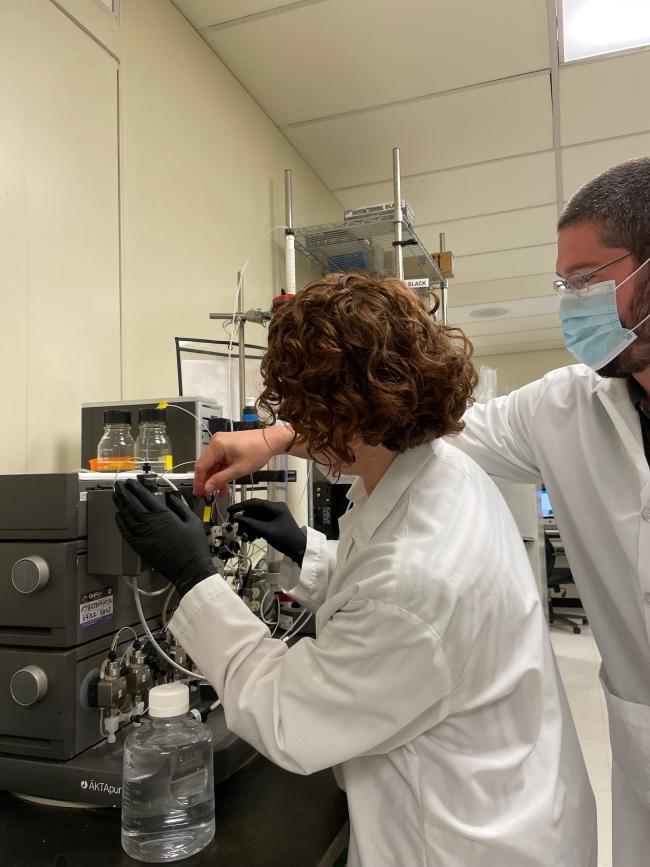For our international customers, please be advised that orders cannot be placed through our website by customers in countries with International Distributor representation.
Operations
The Worthington Product Line
Enzymes are still the major products of Worthington. Technically speaking, Worthington does not actually make enzymes: we extract and purify them from various animal and non-animal sources, plant tissues and various microbial sources such as bacteria, fungi, and molds. A starting material for a particular enzyme is selected according to the prevalence of that enzyme in the material. For example, an enzyme whose function involves making muscles work is going to be found primarily in muscle tissue, so the starting material may be animal muscle or perhaps pig heart; an enzyme involved in fermentation can best be found in a yeast. Some of the animal tissues used at Worthington include beef pancreas, hog kidney, liver, muscle, blood, and intestine. Various proteins are also extracted from horseradish roots, sweet potatoes, almonds, and pokeweed. Some products are isolated from the bacteria E. coli, several species of Clostridia, and various other bacteria. Yeast, mushrooms, whole milk, and eggs are also used.
The most important feature of each of our products is that it functions just as it would in the living cells from which it was extracted. The size and complexity of protein molecules make this difficult, and Worthington's ability to consistently purify enzymes and other proteins in their natural condition is the key to the company's continuing success.

Manufacturing
The most fundamental consideration is that anything which is detrimental to the life of the cells with which we are working is also bad for the product we are trying to extract from those cells. Many isolation procedures we use rely on techniques which alter the solubility and binding of proteins. Differences in solubility and binding charectaristics among different proteins makes it possible to separate proteins from one another through centrifugation and filtering: a method known as fractionating. Some of these procedures rely heavily on adjusting salt concentrations as a way of changing protein solubility without damaging the molecules; consequently, most of the waste generated consists of meat scraps, cell debris, fats, and various non-toxic salts such as sodium chloride and ammonium sulfate. The toxic compounds often associated with the chemical industry are precisely those substances we must avoid like lead, mercury, and many of the organic compounds used for plastics and petroleum products.
There are several solvents we may use for defatting and for breaking open certain kinds of cells, however we continue to minimize their use. When we use any of these solvents, we return all of the spent solvent to its original container. A container of used solvent is labeled, sealed, and stored in an isolated area for a maximum of 90 days. Worthington has its waste removed by a licensed waste removal company, and a complete paper trail is maintained so that every batch of every chemical can be traced from its manufacturer to it final disposition site.
All of the Worthington products are materials extracted from living cells. As such they are all non-toxic. In fact they are just like any of the proteins you consume whenever you eat meat or vegetables.

New Products
Worthington maintains ongoing research and development programs in multiple areas of enzyme and biochemical production. We also work jointly with various researchers at universities and institutes in developing new and customized products for specific applications. Current research has moved away from studying enzymes themselves, but the demand for enzymes in the research lab continues to grow.
The newest areas of research are molecular biology, recombinant and animal-free products. As a primary producer, the quality of our products and our compeitive pricing places us in a unique position as a bulk/OEM supplier to other industry suppliers, diagnostic companies and biopharma, vaccine and biotech bioprocessing companies worldwide.

Marketing
Worthington occupies a vital niche in the field of biomedical research and technology. The specialized nature of our products makes it difficult for new-comers to break into the market because researchers simply want reliable, consistent products with which to work. They do not want to 'shop around' for new sources as long as the material they get is satisfactory and reasonably priced.
Researchers are interested in their own fields of study, and they do not wish to brush up on enzymology if they have a problem: They want to be able to call the supplier and get the answers they need. Worthington has long had a reputation for good technical support. Even though the company name had vanished during the ten year period Worthington had been owned by other companies, its publication, The Worthington Enzyme Manual, could still be found in practically every major biochemical research lab in the world. Since the return of the original company the Manual has been updated and published twice, thereby returning the Worthington name to its prominent position in the research community.
Worthington attends numerous scientific meetings and exhibitions each year where we meet with customers and introduce new products. These events keep us in touch with the latest areas of interest in molecular biology, cell biology, clinical chemistry, neuroscience, microbiology, and cancer research. We also attend technical trade shows at major research centers such as Fort Detrick, NIH, and Harvard/MIT.
Our mailing list is comprised entirely of the names of researchers who have asked specifically to be included in the list. There are currently over 35,000 names. Our customer base includes every major university in the United States which has a biochemistry department as well as every biochemical research institute. Approximately 25% of our sales are to companies and researchers located outside the United States. We have 34 distributors in 28 countries, including Canada. Bulk sales make up between 25% and 30% of our domestic sales. These are sales to companies which use our products in the manufacture of their own products, bioprocessing, diagnostics and to companies which distribute our products under their own label and use them in their products and kits.
